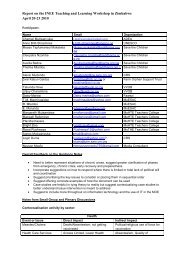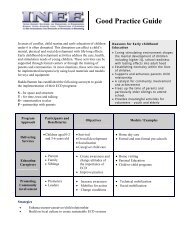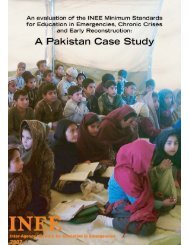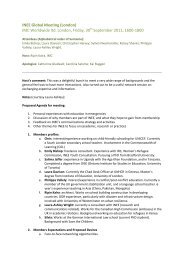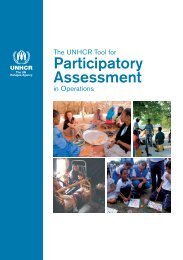Manual for training of facilitators (community component ... - INEE
Manual for training of facilitators (community component ... - INEE
Manual for training of facilitators (community component ... - INEE
You also want an ePaper? Increase the reach of your titles
YUMPU automatically turns print PDFs into web optimized ePapers that Google loves.
Group management<br />
Objectives<br />
To enable the participants to utilize constructive<br />
methods <strong>of</strong> group management<br />
Lecture and small<br />
group work<br />
Nothing can be taught effectively if the group is not receptive. A good facilitator is aware<br />
<strong>of</strong> the individuals in the group and their needs and abilities.<br />
Because a workshop is not very long, <strong>facilitators</strong> need to be very aware very quickly<br />
<strong>of</strong> the quiet people, the dominating people, those that take every opportunity to talk, and<br />
those that are there only to disagree with the content, etc.<br />
They also have to know how they are to manage<br />
these people within the group.<br />
You should look at:<br />
4 how the room is arranged, (does it reflect a feeling<br />
<strong>of</strong> equality or a feeling <strong>of</strong> superiority)<br />
4 whether tests or questions are used as a tool to<br />
demand learning,<br />
4 if the facilitator stands at the front <strong>of</strong> the room all<br />
the time.<br />
4 the group should also look at the facilitator’s manner<br />
with the group: do they show respect to the<br />
learner, do they acknowledge and build on the<br />
knowledge and strengths <strong>of</strong> the learner<br />
You have twenty minutes <strong>for</strong> this task.<br />
Negative <strong>for</strong>ms <strong>of</strong> management are where a facilitator<br />
ignores particular people (knowingly or unknowingly),<br />
when they ignore what a particular person says,<br />
and go ahead to ‘tell their own story’.<br />
Divide the participants into<br />
small groups.<br />
Give each group a sheet <strong>of</strong> flip<br />
chart paper and a marker pen.<br />
Ask them to list all the ways a<br />
group is managed.<br />
When the lists are complete,<br />
display them and work<br />
through the lists with the<br />
participants to see if they are<br />
primarily negative <strong>for</strong>ms <strong>of</strong><br />
management or positive <strong>for</strong>ms<br />
<strong>of</strong> management.<br />
Note especially if participants<br />
thought about preparation as a<br />
management technique<br />
How do you learn best When you feel good or when you feel bad<br />
Very little effective learning takes place when people feel negative. They may be able<br />
to learn by rote and regurgitate (‘spit out’) the in<strong>for</strong>mation but they are unlikely to retain<br />
the in<strong>for</strong>mation and almost certainly will not internalize it. As well it is not possible to<br />
learn if the person does not understand.<br />
It is only when in<strong>for</strong>mation is internalized that behaviour and attitude changes can<br />
occur.<br />
Peace Education is not a knowledge-based programme; it is designed specifically to<br />
create an attitude and behaviour change. If we think about comprehensive education<br />
(which is the system we all have) we can see that it was originally designed to create behavioural<br />
changes - otherwise vocational <strong>training</strong> would be more appropriate. This is also<br />
the basis <strong>of</strong> the differences between schooling and education.<br />
42




